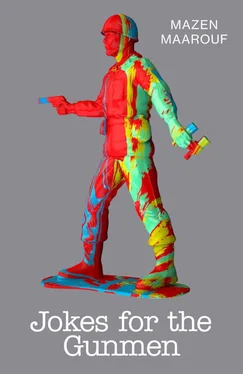Mazen Maarouf
JOKES FOR THE GUNMEN
Translated from the Arabic by Jonathan Wright
I DREAMED THAT MY FATHER HAD A GLASS EYE. When I woke up my heart was pounding like the heart of a frightened cow, but I was smiling and happy. For a moment I thought my dream had finally come true and my father really did have a glass eye.
When I was young, my father gave me a pepper plant for my birthday. It was a strange present. I didn’t understand what it meant at the time. We could hear gunfire from time to time, but we grew used to it, as one grows used to the honking of passing cars. Just as I didn’t understand what was happening in the neighbourhood, I didn’t understand why my father had chosen a pepper plant or why the plant stayed with us. But the plant had two tiny peppers just forming, and I felt intuitively that they represented me and my twin brother. The gunmen fought around our street for months, because of its location between the sea and the city centre. But my mother still sent us to school – me and my twin brother, who was deaf, and on the way he would get frightened and stick close to me for protection.
I didn’t like my father’s present at the time. I found it odd and ugly. I didn’t tell any of the other children at school about it. But I looked after it, as my father had asked me to. My father owned a laundry that did ironing and dry cleaning, and he taught me to wipe the little budding peppers with a piece of cotton and to light a candle over them so they would get vitamins and grow. He would wipe them very gently. ‘You have to take care of them so that they produce more buds,’ he told me. ‘This pepper plant must become your friend.’ My father’s behaviour led me to believe that in every tiny pepper there was a soul that I had to protect at any cost. That was my little mission in the war, and sometimes, when the fighting was intense and the gunmen were using heavy weapons such as mortars and RPGs, my terrified mother and brother would lie flat on the floor in the corridor, between the sitting room and the kitchen and the bathroom, while I stood near the television, the part of the house most exposed to snipers, holding a candle to cast light over the pepper plant, in the belief that our souls – my soul, my brother’s, my father’s and my mother’s – were also inside the tiny peppers, and that if I did this none of us would be in danger of being killed, especially my father, who didn’t come home until the evening. That’s how the close association between me and the pepper plant began, and I became more affectionate towards it, although at one stage I did stop giving it water, but spat on it instead. I would drink the water instead of giving it to the plant, because my mother said there was a water shortage and people were dying of thirst. I was frightened and started drinking that water, imagining that it would stop me getting thirsty in the future. I also felt that watering the pepper plant with my own saliva made me closer to it. But then my mother saw me doing it one day and told my father when he came home from work.
That was the first time my father whipped me with his belt. He was so angry I couldn’t believe it. Did spitting on the pepper plant really call for all this anger, I wondered. I saw my deaf brother screwing up his eyes and trembling each time the belt landed on me. When my father went away, I went up to the pepper plant, sobbing, my eyes drowned in tears, and tried to work out which of the peppers held my father’s soul. It was easy. I chose the biggest pepper, broke it off spitefully and crushed it under my foot.
AT SCHOOL THE KIDS COMPETED WITH EACH other by telling stories about how their fathers beat them. These stories illustrated the power each father had in his household. Power was the most important subject, as far as we were concerned, during the war. My father wasn’t at the top of the hierarchy of fathers, of course, because he hadn’t invented the cruellest punishment. But I told the other kids boastfully that he had whipped me with a leather belt. When I was asked why, I lied. I didn’t say it was because I had spat on the pepper plant. Instead I made up a story that showed me doing something really daring, that showed I was made of heroic stuff. ‘I swallowed my mother’s bottle of Valium pills,’ I said. ‘And my father whipped me till I threw up the pills all in one go.’
Some days after I told my heroic story, a friend of mine came up to me and told me he’d seen my father being beaten up in the street. ‘He was wearing a brown belt,’ he said, ‘but he didn’t use it. Isn’t that the belt he whipped you with?’ ‘Yes,’ I replied with a nod. Because my father only had one brown belt. My friend, who saw the whole scene, described it to me as if it were happening in a peep show he was watching. When my father came home, I noticed that the marks on his face were not scalds from the steam in the laundry; in order to find out how painful they were, I prodded the largest mark on his face with my finger. He was asleep, but he started from the pain and turned his face away without opening his eyes, pretending he was still asleep.
It was then that I realized that my father’s soul had left the pepper plant for ever. I blamed myself, because if I hadn’t broken off the largest pepper and trodden it underfoot, my father wouldn’t have become so weak, or so cowardly either. That’s what hurt me most.
My father didn’t beat me after that, despite my repeated attempts to provoke him. I spat on the pepper plant several times in front of him, but he didn’t react at all, no matter how big the glob of spit was or how noisily I did it.
My father stopped speaking to me so often. He started spending most of his time in the bathroom, sitting on the edge of the bathtub. I would snoop on him through the keyhole and he looked absent-minded. He even started drooling at the mouth without realizing it. From behind the door – like a friend offering him advice as they fished, sitting side by side by the sea – I whispered through gritted teeth, ‘Don’t cry, don’t cry.’ And my father never did cry, which convinced me that he hadn’t completely lost his grip.
A short while later, after he got back from work with footprints on his clothes, he picked up the television and put it under the tree in front of our building. There was nothing wrong with the television; my father just wanted everyone to see that that he wasn’t watching anything political. My father never stopped going to work, because his laundry was responsible for washing and ironing clothes for the guests at a large hotel, most of them foreign journalists who had come from far away to write about the war that was going on in our street and in other nearby streets.
The story of my father being beaten up spread among the kids at school and, because of it, I was known as ‘the grasshopper’, on the grounds that my father was also a grasshopper, since grasshoppers always jump and never attack. I tried to defend myself against this slur by inventing stories about how my father beat me violently. On my way to school early in the morning, for example, I took to burning my arm or my stomach with cigarettes, or ripping my school uniform or scratching my own throat or eyes. I would go down some deserted alley and give myself a dose of self-inflicted morning torture. The pain was sometimes severe. And when I went into school like this, the kids would gather round me. Leaning on the gate and pretending to be a wreck, I would volunteer, ‘It’s my father. He beat me this morning. He’s no grasshopper, like you think he is.’ But the headmistress soon called me in. After examining me, she said, ‘I have a feeling that you’ve done this to yourself,’ on the grounds that no father would scratch his young son’s neck while beating him or burn him with cigarettes and then send him to school. She summoned my mother, who came at once and laid into me with her fists as we were leaving school, within sight of the other kids, who were still in class; they crowded around the windows to watch and snicker like rats.
Читать дальше












